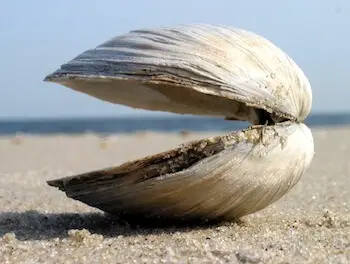Very happy and content.
As happy as a clam
What's the meaning of the phrase 'As happy as a clam'?
What's the origin of the phrase 'As happy as a clam'?
Why would clams be happy? It has been suggested that open clams give the appearance of smiling. The derivation is more likely to come from the fuller version of the phrase, now rarely heard – ‘as happy as a clam at high water’. Hide tide is when clams are free from the attentions of predators; surely the happiest of times in the bivalve mollusc world. The phrase originated in the north-eastern states of the USA in the early 19th century. The earliest citation that I can find is from a frontier memoir The Harpe’s Head – A Legend of Kentucky, 1833:
“It never occurred to him to be discontented… He was as happy as a clam.”
The first definitive record that I can find of the ‘high water’ version is from the US newspaper The Bangor Daily Whig And Courier, December 1841:
“Your correspondent has given an interesting, and, undoubtedly correct explanation of the expression: ‘As happy as a clam at high water.'”
However, several biographies of General Robert E. Lee state that he used the expression ‘as happy as a clam at high water’ on more than one occasion. One such states that he included it in a letter that he wrote in 1833, which would pre-date the above by a few years. I can’t find a record of the letter in question so the account is second-hand, but it is entirely plausible that Lee would have used the expression at that time.
The expression was well-enough known in the USA by the late 1840s for it to have been included in John Russell Bartlett’s Dictionary Of Americanisms – A Glossary of Words And Phrases Usually Regarded As Peculiar To The United States, 1848:
“As happy as a clam at high water,” is a very common expression in those parts of the coast of New England where clams are found.
Also in 1848, the Southern Literary Messenger from Richmond, Virginia expressed the opinion that the phrase “is familiar to everyone”.
See other ‘as x as y similes‘.
See other phrases that were coined in the USA.
The history of “As happy as a clam” in printed materials
Trend of as happy as a clam in printed material over time
Related phrases and meanings
Browse more Phrases
About the Author

Phrases & Meanings
A-Z
A B C D E F G H I J K L M N O P Q R S T UV W XYZ
Categories
American Animals Australian Bible Body Colour Conflict Death Devil Dogs Emotions Euphemism Family Fashion Food French Horses ‘Jack’ Luck Money Military Music Names Nature Nautical Numbers Politics Religion Shakespeare Stupidity Entertainment Weather Women Work
How did we do?
Have you spotted something that needs updated on this page? We review all feedback we receive to ensure that we provide the most accurate and up to date information on phrases.
